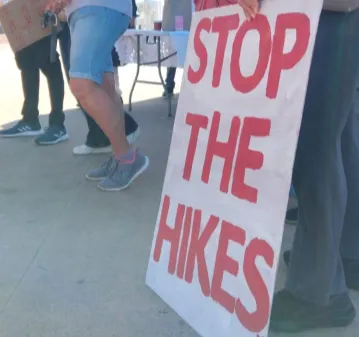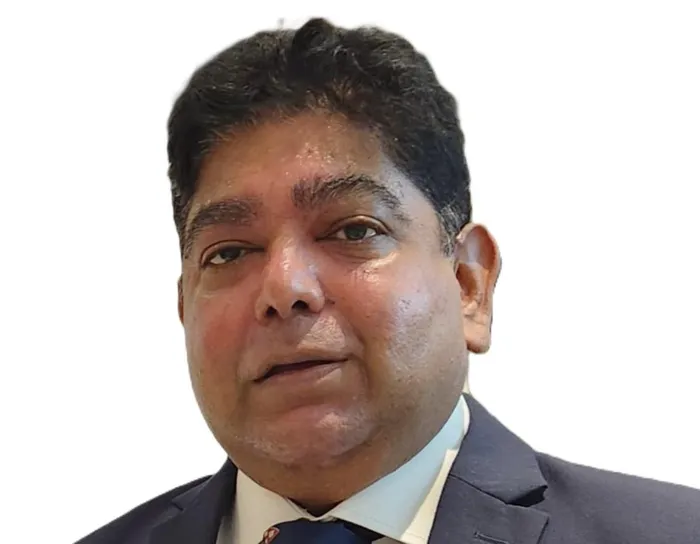
eThekwini Ratepayers Protest Movement held a placard protest on the Durban Beachfront.
Image: Zainul Dawood
SOUTH Africa’s third iteration of the 2025 National Budget, colloquially referred to as Budget 3.0, is the consequence of the Government of National Unity (GNU) partners not being in agreement on the contents of the previous two versions of the budget.
Historically, a most embarrassing time for the finance ministry, as the budget was not able to pass the approval of the house. In the past 30 years, when the ANC was in the majority, it was a fait accompli that the budget would be paraded through parliament without comment or question. Our GNU is essentially a partnership between several parties, some historically in opposition to each other, that are now unlikely partners that have come together to collectively form the government.
One would have assumed that these parties would air out their difference behind closed doors and show the world a unified face, but this was a naïve assumption. The DA appeared to have suffered from amnesia, as a member of the GNU, well represented in the form of the Deputy Minister of Finance, who collectively crafted the budget, then opposed a VAT increase to fund essential spending.
One can only describe the DA's behaviour as grandstanding during the first iteration of the budget, where they opposed the VAT increase of 1%. Enjoying their moment of the limelight, they opposed the revised VAT increase of 0.5% immediately and 0.5% in a year's time in the 2nd Iteration of the budget. Remarkably, their voters, generally the wealthy and the white community, may not have felt the impact of a VAT increase, but the sales tax would have impacted the middle-income earners, leaving the poor unscathed.
Some have explained the real motive of the DA was to force the reduction of social spending to avoid a widening budget deficit. Budget 3.0 is the result of incredibly difficult choices trying to fund a R65 billion shortfall, which a VAT increase would have yielded.
Our official unemployment rate of almost 33% , forces many South Africans to rely on Social grants. The Covid-19 Social Relief of Distress (SRD) grant, introduced to provide financial assistance to the vulnerable during the pandemic, was meant to be a temporary measure consisting of R370. The SRD and its poverty relief is cancelled from March 2026. This saving will add approximately R35 billion to next year's budget.
Old age and other grants, which the treasury planned to increase over a 2-year period, will now increase only this year, saving the government R6.6 billion over three years. Motorists and Commuters will pay an extra 16 cents per litre on petrol and 15 cents per litre on diesel to help offset lost revenue from the withdrawal of the VAT rate increase.
Passenger Rail Agency of South Africa (PRASA) would originally have received R19.2 billion over three years to assist with a turnaround at the shattered commuter rail company; this allocation will be reduced to R12.3 billion. R2.3 billion is saved by scrapping plans to digitalise Home Affairs over a 3-year period, which is a setback to its efforts to make the process of getting identity documents, passports and other documentation more efficient.
The education department had a three-year budget to expand access to early childhood development and compensate employees at the provincial level, which has now been drastically reduced by R9.5 billion. The already understaffed health department will suffer further as funds allocated for salaries to hire unemployed doctors and to buy medical supplies are slashed by R8.2 billion.
We have a huge National debt to service of R426 billion, translating to 20% of the revenue collected from taxes, which is currently spent on servicing interest and debt repayments on loans built from past budget deficits. Currently, we are growing at a very slow pace of 0.6%, while many emerging economies and our BRICS partners like India and China grow at rates of over 5%. Slow growth makes job creation, increased standards of living, including education and healthcare, impossible to achieve. One of the obvious solutions is promoting Trade.
Our president’s recent visit to the White House was aimed at trading more trade and lowering tariffs with the USA, while time will tell the consequence of BEE rules for Elon Musk's Starlink will be a small price to pay if we can retain a favourable trading relationship with our biggest trading partner. Strong trade relations help retain a healthy demand for Rand.
Currency stability makes for easier National debt redemption and helps stabilise the price of Oil imports, calming inflationary and interest rate swings. As we reflect on a busy economic week of Budget 3.0 and Ramaphosa’s White House visit, we spare a thought for the poorest in our land, who are now ever poorer after this budget.
Budget Revenue = R2.2 Trillion
Budget Expenditure = R2.6 Trillion
Budget Deficit = R377.9 Trillion

Advocate Lavan Gopaul
Image: File
Advocate Lavan Gopaul is the director of Merchant Afrika.
** The views expressed do not necessarily reflect the views of IOL or Independent Media.
Related Topics: